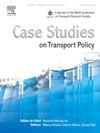Energy transition and decarbonization of road transportation: A case study of São Paulo’s Race to Zero by 2050, Brazil
IF 2.4
Q3 TRANSPORTATION
引用次数: 0
Abstract
The transportation sector is essential for climate change mitigation, especially in reducing fossil fuel dependence. Brazil, a top 10 automotive market, faces significant challenges in decarbonizing its transportation sector, with São Paulo state, the fourth-largest emitter, playing a pivotal role. This study examines the São Paulo State Energy Plan 2050 Race to Zero (PEE 2050), focusing on road transport. It reviews São Paulo’s historical energy actions, integration with climate policies, global and regional trends in transport electrification and biofuels, and energy demand projections under an emission mitigation scenario. By 2050, the scenario predicts a 41% reduction in diesel consumption, widespread vehicle electrification, a 99% drop in gasoline use for light vehicles, and increased biofuel demand. Biomethane use is projected at 1.5 billion m, ethanol demand at 13 billion liters for passenger cars, and higher blending rates for biodiesel and green diesel. Hydrogen is expected to complement the energy mix post-2040, supported by advances in storage and global investments. The study outlines five critical fuel transition pathways and policy measures essential for decarbonization. It concludes that PEE 2050 offers innovative methodologies and scenarios, providing valuable insights for policymakers, stakeholders, academia, and the public, advancing energy transition and decarbonization in São Paulo and Brazil.
能源转型与道路运输的脱碳:巴西圣保罗州2050年零碳排放的案例研究
交通运输部门对减缓气候变化至关重要,特别是在减少对化石燃料的依赖方面。巴西是全球排名前十的汽车市场之一,在交通运输部门的脱碳方面面临着重大挑战,其中第四大碳排放国圣保罗州发挥着关键作用。本研究考察了圣保罗州能源计划2050竞赛至零(PEE 2050),重点是公路运输。报告回顾了圣保罗历史上的能源行动、与气候政策的结合、交通电气化和生物燃料的全球和区域趋势,以及在减排情景下的能源需求预测。该情景预测,到2050年,柴油消费量将减少41%,汽车电气化将广泛普及,轻型汽车的汽油使用量将下降99%,生物燃料需求将增加。预计生物甲烷使用量将达到15亿立方米,乘用车对乙醇的需求将达到130亿升,生物柴油和绿色柴油的混合率将更高。在储能技术进步和全球投资的支持下,预计氢将在2040年后成为能源结构的补充。该研究概述了五种关键的燃料过渡途径和脱碳所必需的政策措施。报告的结论是,PEE 2050提供了创新的方法和情景,为政策制定者、利益相关者、学术界和公众提供了有价值的见解,推动了圣保罗和巴西的能源转型和脱碳。
本文章由计算机程序翻译,如有差异,请以英文原文为准。
求助全文
约1分钟内获得全文
求助全文

 求助内容:
求助内容: 应助结果提醒方式:
应助结果提醒方式:


